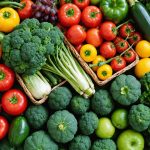Introduction to Nutritional Needs for Eye Health in Seniors
As we age, nutritional needs become increasingly crucial for maintaining good health, especially for our eyes. Eye health is significantly impacted by diet, and for seniors, this connection cannot be overstated. Understanding the role of essential nutrients helps preserve vision and combat age-related eye health issues.
Common age-related problems, such as cataracts and macular degeneration, can impair vision if appropriate steps aren’t taken. Nutrition acts as a powerful ally in managing these conditions, with certain vitamins and minerals directly linked to eye health. For instance, nutrients like lutein, zeaxanthin, vitamins C and E, and zinc play pivotal roles in maintaining healthy eyes.
Topic to read : How can seniors develop effective communication skills with their healthcare providers?
Dietary choices can either mitigate or exacerbate the progression of eye diseases. Including leafy green vegetables, citrus fruits, and nuts in daily meals provides necessary antioxidants and promotes ocular health. Additionally, omega-3 fatty acids, found in fish like salmon, are vital for retina health and reducing inflammation.
In essence, adhering to a nutrient-rich diet empowers seniors to safeguard their eyesight, promoting both longevity and quality of life. By educating themselves about essential nutritional requirements, seniors can embark on a path towards better vision protection.
Additional reading : What are effective strategies for seniors to improve their sleep quality?
Key Nutrients for Eye Health
When considering eye health, it’s crucial to understand the role that various vitamins and minerals play. Among these, Vitamin A is paramount for maintaining vision. It’s a key component of rhodopsin, a protein in the eyes that allows us to see in low-light conditions. A deficiency in this vitamin can lead to vision problems such as night blindness.
Antioxidants like Vitamin C and Vitamin E also contribute significantly to eye health by slowing down the progression of age-related conditions, such as cataracts and macular degeneration. These nutrients counteract oxidative stress caused by harmful free radicals, thus protecting the delicate structures of the eyes. Vitamin C is found plentifully in fruits like oranges and strawberries, while Vitamin E is abundant in nuts and seeds.
Furthermore, Omega-3 fatty acids, present in fish such as salmon and flaxseeds, are vital for the structural integrity of the eye. They help in maintaining moisture levels in the eyes, preventing dry eye syndrome. This essential fatty acid supports the retinal structure and function, thereby playing a critical role in maintaining overall vision quality. Prioritizing a diet rich in these nutrients can significantly benefit your eye health.
Detailed Nutrient Analysis
Exploring the vast array of nutrient sources available can reveal the key to maintaining a balanced diet. Aligning your choices with recommended food recommendations can enhance overall well-being.
Vitamin A Sources
Incorporating foods rich in Vitamin A supports essential functions like vision and immune health. Excellent choices include carrots, sweet potatoes, and leafy greens. Integrating these vegetables is simple: add them to smoothies, salads, or stir-fries. For those with dietary restrictions, such as veganism, fortified plant-based milks can serve as an alternative.
Antioxidants and Their Sources
Antioxidants are vital for protecting the body against oxidative stress. Berries, nuts, and dark chocolate are optimal sources. Sprinkle nuts on yogurt, or enjoy a berry and dark chocolate dessert. If you have allergies, opt for antioxidant-rich substitutes like seeds or certain fruits like kiwi.
Best Sources of Omega-3 Fatty Acids
Omega-3 fatty acids are crucial for heart and brain health. Fatty fish like salmon and mackerel are rich in these nutrients. For those adhering to a plant-based diet, flaxseeds and walnuts are favourable alternatives. Add flaxseed to morning oats or incorporate walnuts into snack mixes for a health-conscious boost.
Understanding and integrating these nutrients can ultimately enrich your diet.
Sample Meal Plans for Vision Health
Creating a meal plan that supports your vision can be a delicious journey! A well-rounded vision diet incorporates foods that are rich in essential nutrients like Vitamin A, Omega-3 fatty acids, and antioxidants. Here’s a weekly guide to get you started, featuring eye-healthy foods.
Weekly Meal Plan
Monday
- Breakfast: Oatmeal topped with berries and a glass of fortified orange juice
- Lunch: Spinach salad with feta cheese, walnuts, and a citrus vinaigrette
- Dinner: Grilled salmon with roasted sweet potatoes
Wednesday
- Breakfast: Greek yoghurt with flax seeds and fruit
- Lunch: Whole-grain wrap with turkey, avocado, and mixed greens
- Dinner: Stir-fried tofu with broccoli and bell peppers
Friday
- Breakfast: Scrambled eggs with spinach and a slice of whole-grain toast
- Lunch: Quinoa salad with chickpeas, tomatoes, and cucumbers
- Dinner: Oven-baked chicken with quinoa and a side of kale
Suggested Recipes
Incorporate a variety of these meals to ensure balanced nutrition:
- Baked Salmon with Herbs
- Quinoa and Black Bean Bowl
- Sweet Potato Curry
Focusing on meal planning can help maintain the variety needed for a well-rounded diet, protecting your vision while keeping your meals exciting and nutritious.
Supplements and Their Role
In the realm of maintaining and enhancing eye health, eye health supplements play a significant role. These supplements are designed to fill nutritional gaps that might otherwise lead to deficiencies affecting vision health. Among the popular choices are omega-3 fatty acids, lutein, and zeaxanthin. These nutrients are touted for their protective properties against common eye conditions such as macular degeneration and cataracts.
The benefits of these supplements can be significant. Essential fatty acids like omega-3s are known to support tear production, potentially alleviating dry eye symptoms. Lutein and zeaxanthin, on the other hand, are antioxidants that promote healthy retinal function and may reduce the risk of chronic eye diseases. However, like any health products, there are risks associated with supplementation. It’s crucial to be cautious of overconsumption, which can lead to adverse effects.
Choosing the right eye health supplements requires consideration of individual needs. Consulting with a healthcare provider can guide decisions, ensuring that supplements do not interfere with existing health conditions or medications. A balanced diet rich in natural sources of eye-healthy nutrients remains a primary recommendation for comprehensive eye care.
Challenges in Meeting Nutritional Needs
As people age, addressing nutritional challenges becomes increasingly important. Seniors often face a variety of caregiving and health issues that impact their ability to maintain a balanced diet. Difficulties such as reduced appetite, changes in taste, and dental problems contribute to these challenges. Moreover, medication side effects can also affect food intake, leading to inadequate nutrition.
To manage these nutritional challenges, there are several strategies that seniors and caregivers can adopt. Prioritising nutrient-dense foods like fruits, vegetables, and whole grains can help combat these barriers. Preparing smaller, more frequent meals may encourage better intake. Additionally, simplifying meal preparation by using pre-cut vegetables or using slow cookers can make the task less daunting.
It is essential for seniors to consult healthcare providers regarding their diets. Healthcare professionals can offer personalised advice, taking into account any existing medical conditions or medications that may influence dietary requirements. They can also provide guidance on necessary vitamins or supplements to address deficiencies.
Overcoming these nutritional challenges with tailored strategies can significantly enhance health and well-being in the aging population, ensuring a higher quality of life. Consulting experts in nutrition can bridge the gap between challenges and effective solutions.
Lifestyle Choices Impacting Eye Health
A healthy lifestyle is crucial for maintaining optimal eye health. Regular exercise plays a significant role in promoting good vision. Engaging in physical activities enhances blood circulation, which efficiently delivers oxygen and nutrients to the eye tissues. This process can help prevent the onset of conditions like glaucoma and age-related macular degeneration.
Hydration is another essential factor in eye care. Adequate water intake keeps the eyes moist, reducing the likelihood of dryness and irritation. It’s essential to maintain the body’s fluid balance, as dehydration can lead to decreased tear production and compromised eye comfort.
Incorporating specific lifestyle modifications can significantly reduce the risk of developing various eye conditions. For instance, incorporating dietary choices rich in antioxidants—like leafy greens and fish high in omega-3 fatty acids—can support eye health. Limiting exposure to harmful UV rays by wearing sunglasses and practicing healthy screen time habits can also protect the eyes from strain and damage.
Overall, making informed lifestyle choices is vital for preserving vision and preventing eye-related issues. By focusing on regular exercise, adequate hydration, and other healthy habits, individuals can contribute to their long-term eye health and well-being.
Conclusion: Integrating Nutritional Insights
Integrating nutritional insights into your daily routine can have a profound impact on your vision health. To effectively implement nutritional strategies, focus on incorporating a balanced diet that includes a variety of nutrients known for supporting eye health. This includes nutrients like omega-3 fatty acids, vitamins A, C, and E, and minerals such as zinc. These vision health strategies can be integrated into everyday meals, promoting overall health and particularly benefiting eye function.
Prioritizing eye health should become a part of your daily routine. Small changes, like consuming more leafy greens, fish, and nuts, as well as staying hydrated, can make a significant difference. It’s essential to remain conscious of nutrient intake and seek to maintain a diet that aligns with nutritional integration approaches.
For those interested in expanding their understanding, a range of resources are available. These educational materials can deepen your knowledge and guide you in creating and following a personalised plan that prioritizes eye health. Whether through books, online courses, or professional dietary consultations, continuous learning will aid in effectively implementing these strategies. Embrace this journey towards healthier vision through informed nutritional choices.











